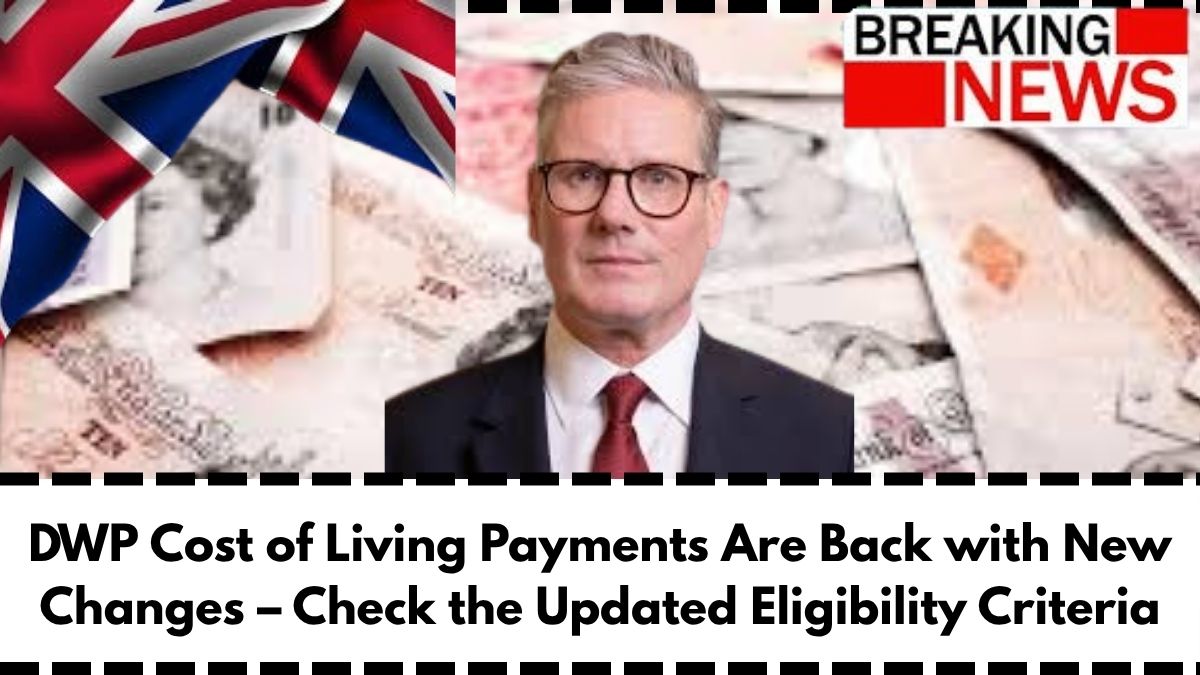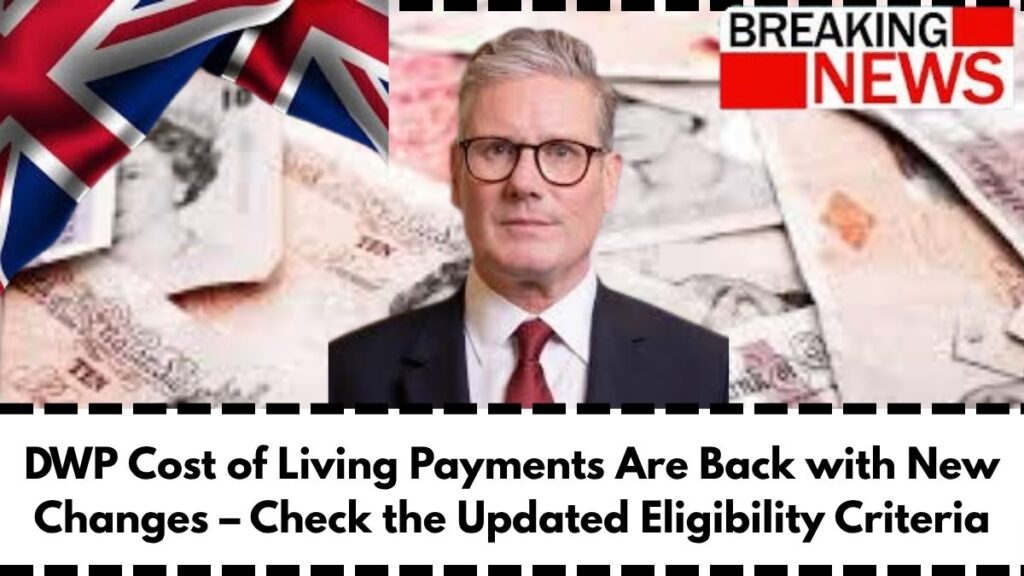As inflation and energy costs continue to strain household finances in the UK, the government has reshaped its cost of living support for 2025. While the era of automatic Cost of Living Payments has officially ended, new and expanded forms of support have been introduced to protect vulnerable individuals and families. This guide provides a comprehensive overview of the current cost of living support measures, how they differ from previous schemes, eligibility requirements, and how to access assistance.

Summary Table: 2025 Cost of Living Support
Support Type |
Details |
|---|---|
Direct Cost of Living Payments |
Ended after February 2024; no new payments in 2025 |
Household Support Fund (HSF) |
Extended to March 2026 with £742 million funding; managed by local councils |
Universal Credit Deduction Cap |
Reduced from 25% to 15% starting April 30, 2025 |
Benefit Rate Increase |
Most benefits increased by 1.7% in April 2025 |
Help to Save Scheme |
Up to £1,200 in bonuses over 4 years for eligible savers |
Regional Programs |
Tailored support in Scotland, Wales, and England |
Official Website |
End of Direct Cost of Living Payments
Between 2022 and 2024, millions of UK residents benefited from direct government payments intended to ease the burden of inflation and rising energy bills. These automatic payments included:
-
£900 for those on means-tested benefits
-
£150 for people receiving disability-related benefits
-
£300 added to Winter Fuel Payments for pensioners
However, in an official statement, the Department for Work and Pensions (DWP) confirmed that no additional Cost of Living Payments will be made in 2025. The final payment of £299 was issued in February 2024.
New Support Measures Introduced in 2025
With the end of automatic payments, the government has pivoted to new and expanded support schemes requiring proactive application and engagement.
1. Household Support Fund (HSF) Extended
The Household Support Fund has been extended until March 2026, with £742 million allocated to support vulnerable households. This fund is managed by local councils and offers:
-
Emergency cash for essentials like food and utilities
-
Vouchers for energy and water bills
-
Grants for household items
-
Council tax relief
Important: The type and amount of support vary by council, and most support requires an application. Visit your local council’s website to learn more.
2. Reduction in Universal Credit Deduction Cap
Effective April 30, 2025, the maximum deduction from Universal Credit payments for debt repayment has been reduced from 25% to 15%. This change, part of the Fair Repayment Rate, will help around 1.2 million households, including:
-
700,000 households with children
-
Claimants repaying advance payments, benefit overpayments, or third-party debts
This adjustment means that households retain on average £420 more annually, providing crucial breathing room.
3. Modest Increase in Benefit Payments
Most benefit rates saw a 1.7% increase in April 2025, offering a small uplift for recipients of Universal Credit, Pension Credit, and other income-related benefits. While modest, it provides some relief against continued price pressures.
4. Enhanced Help to Save Scheme
The Help to Save program is now more accessible for those receiving Universal Credit. Eligible individuals can earn up to £1,200 in bonuses over four years by saving small amounts regularly. This program helps low-income households build long-term financial resilience.
5. Region-Specific Support Across the UK
Scotland
-
Carer’s Allowance Supplement: £293.50 twice yearly
-
Child Winter Heating Assistance: £235 for eligible families
-
Discretionary Housing Payments for rent shortfalls
Wales
-
Care Leaver Support: £1,600 monthly payments for care leavers
-
Crisis Fuel Assistance: Via the Discretionary Assistance Fund
England
-
Warm Home Prescription Pilot: NHS-linked energy support
-
Various Local Council Schemes: Through extended HSF
Eligibility for Support in 2025
Household Support Fund
-
Income-based eligibility
-
Financial hardship due to unexpected costs
-
Struggling with bills or housing
-
Limited savings or no access to other help
Universal Credit Deduction Reform
-
Applies automatically to all Universal Credit recipients with existing deductions
How to Apply or Access Support
Key Steps:
-
Visit GOV.UK for national updates and benefit calculators.
-
Check local council websites for Household Support Fund availability.
-
Use benefits calculators to identify any unclaimed entitlements.
-
Contact service providers for social tariffs on broadband and energy.
-
Seek help from Citizens Advice or StepChange if you’re in debt.
Stay Alert: Avoid Scams
Fraudulent messages claiming to offer new Cost of Living Payments are on the rise. Be cautious of:
-
Texts or emails requesting personal or banking information
-
Fake links claiming to be from DWP or HMRC
-
Messages asking you to “apply” for a payment (genuine schemes are announced officially)
Always verify through GOV.UK and never share personal information through unverified channels.
Looking Ahead: Will There Be More Support in the Future?
While no new direct Cost of Living Payments are planned for 2025, further economic challenges could prompt future initiatives. Possible triggers include:
-
A resurgence in inflation
-
Sharp energy price hikes
-
Public or political pressure
Monitor updates via GOV.UK or reliable sources like national news outlets.
Recipient Feedback and Government Evaluation
A January 2025 DWP report revealed how previous Cost of Living Payments were used:
-
Majority spent on essentials: energy, food, rent, and debt
-
Communication gaps were identified: many were unaware of eligibility or timing
This feedback has led to improved communication and targeting in newer schemes like HSF and Help to Save.
Smart Financial Planning Tips
-
Budget carefully: Don’t rely on automatic payments.
-
Maximize entitlements: Use benefit calculators and local resources.
-
Stay informed: Check council and government websites regularly.
-
Build savings: Use tools like Help to Save.
-
Seek debt advice early: Reach out to support services as needed.
FAQs
Q1: Are new Cost of Living Payments coming in 2025?
No, the DWP has confirmed there will be no new direct Cost of Living Payments in 2025. Assistance now focuses on expanded schemes like the Household Support Fund and changes to Universal Credit deductions.
Q2: How do I apply for the Household Support Fund?
Visit your local council’s website or contact their customer service. Each council has its own eligibility rules and application process.
Q3: What’s the new deduction cap for Universal Credit?
As of April 30, 2025, the maximum deduction is 15%, down from 25%. This change is automatic and requires no application.
Q4: Where can I find trustworthy information?
Use GOV.UK and avoid social media for official updates. Report suspicious messages that ask for personal information.
Conclusion
Although direct Cost of Living Payments have ended, the UK’s financial support framework has evolved into a more localized and responsive system. Households are now encouraged to engage proactively with available support schemes, many of which are more targeted and sustainable in the long term.
By staying informed, checking eligibility, and applying through official channels, vulnerable households can still access significant help in navigating the current cost of living challenges.
For More Information Click Here





